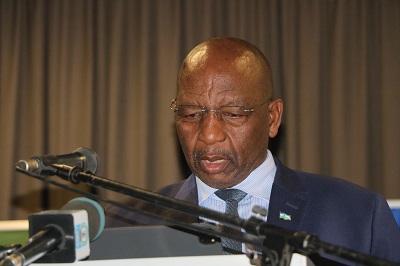By: Thoboloko Ntšonyane
MASERU – The Prime Minister (PM) Rt Hon Ntsokoane Matekane extends an invitation to South Korea’s government and its private sector to explore investment opportunities in Lesotho.
He says Lesotho “embraces” the vision of the Korea-Africa Summit, which envisions a future where Korea and African countries collaborate on matters of sustainable development, solidarity, and shared growth.
“Equally important and cross cutting is the energy sector. Sustainable cooperation is imperative in fully utilizing environmentally friendly sources of energy. Lesotho for instance, is richly endowed with hydro, solar and wind energy resources which makes it the potential Southern African Power Pool.
“These resources are ready for development and collaboration with other friendly countries. In this regard, we invite the Government of the Republic of Korea and the Korea Private Sector to consider investments in Water harvesting, hydro power generation, solar power and all forms of clean and renewable energy,” he tabled the country’s proposition.
The PM underscores to the Summit the urgent need for sustainable energy solutions in Lesotho, expressing confidence that Korean expertise and investment could come in handy to the realization of the country’s green energy ambitions.
The Summit which took place from June 4th to 5th and also the first Korea-Africa Summit, saw the attendance of about 30 African Heads of State and Government including the African Union (AU) and its institutions and representatives of the African Development Bank (AfDB). The Summit had convened under the theme: “The Future We Make Together: Shared Growth, Sustainability, and Solidarity”.
In this Summit, the government of South Korea pledges to the tune of $10 billion to Africa in foreign aid by 2030 and also offered $14 billion in export credits to Korean firms with an appetite to invest in African markets.
It should be recalled that Lesotho is gearing up for the renewable energy path to address its energy challenges. The country now produces about 30 megawatts of clean energy through the Ramarothole Solar Plant in Mafeteng, which the government constructed with a loan from China.
Phase one of this project was completed last year, and the electricity produced has been added to the national grid.
However, it is not clear at this stage when phase two at Ramarothole will commence. When completed, it is expected to produce about 50 megawatts.
The country has also begun rolling out solar energy in communities that are far from the grid, with support from development partners such as the European Union (EU) and the United Nations Development Programme (UNDP).
The PM’s delegation was made of the Minister of Trade, Industry and Business Development Hon Mokhethi Shelile, Minister of Information, Communications, Science, Technology and Innovation Hon Nthati Moorosi, the Minister of Energy Prof Nqosa Mahao and senior government officials.
“We note with high regard that Korea-Africa relations, which started from the 1950s with the invaluable participation and support of some African countries during the Korean War, have developed into a mutually beneficial relationship. We share the view that there is a need to forge a new strategic cooperation between Korea and Africa drawing upon the uniqueness of the partnership between the two sides and based on mutual trust, solidarity and similar historical experiences.
“Witnessing rapid changes in the international arena and the emergence of complex challenges including climate change, conflicts, food insecurity, health crises, energy crises and supply chain disruptions, which have underscored the importance of deepening international cooperation and solidarity, we wholeheartedly welcome the timely holding of the Korea-Africa Summit.
“In this regard, while noting the commonalities and complementarity between Korea’s vision of serving as a ‘Global Pivotal State’ and Africa’s vision of an integrated, prosperous and peaceful Africa, as encapsulated in the African Union’s ‘Agenda 2063’, we determine to build a future together based on a strong and mutually beneficial partnership structured around three pillars: Shared Growth, Sustainability, and Solidarity,” reads the declaration that was made at the Seoul.


